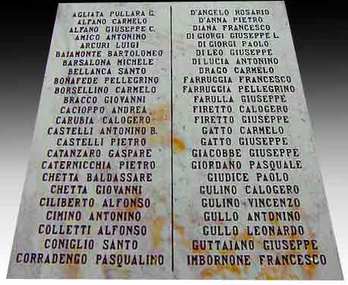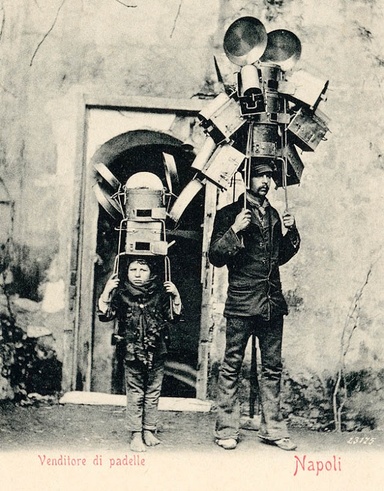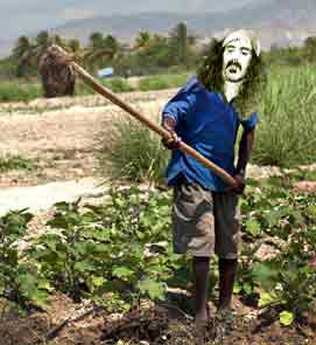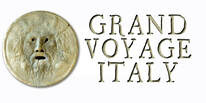 Interpreting names is fun: Amico (friend), Bonafede (good faith), Bracco (hound), Caciopo (a little cheese), Borsellino (purse), Gatto (cat), Giordano (Jordonian), Guidice (Court of Law), Guttaiano (gut in the anus) Interpreting names is fun: Amico (friend), Bonafede (good faith), Bracco (hound), Caciopo (a little cheese), Borsellino (purse), Gatto (cat), Giordano (Jordonian), Guidice (Court of Law), Guttaiano (gut in the anus) We have learned that long before the Roman Empire, Italy was settled by the Greeks. Surnames were unknown in ancient Greece. The Greeks identified individuals they knew by first name, the name of the father, and the town of origin. So a name might be Alexus Nicolaus Pirgos (Alexus, son of Nicolaus from the town of Pirgos). Similarly, in Rome individuals were named in three parts. These parts included a basic first name, a name in which a person's family was identified, and also a unique name that described that individual. This three part name was common throughout Italian history until medieval times, when the latter two names were dropped and people were known only by one name. This tradition of only giving one name began to cause confusion among citizens, and slowly Italians began adding a second distinguishing label to their names to identify one person from another. Some of these surnames can give a lot of information about a family's history. Officials say that there are over 350,000 surnames (family names) in Italy and around the world. There are some that are intact and authentic--the same name having been in continuous use, with the same spelling for almost 1000 years. With other names, their meanings cannot be interpreted because of changes in the spelling, their meanings being lost to time, their root word being lost in an obscure dialect, or simply because the name was changed during emigration to another country. Categories of Surnames There are different types of surnames and depending on the type, one can try to interpret their meaning. Some are much more informative, others not so much, and still other types are downright entertaining: Patronymic surnames usually have the preposition di ("from", expressing possession) to say that one was the child of a certain individual. These surnames are very common throughout Italy, although some also use the preposition de, and some join the two words into one and others keep them separate (ie: Mario DeFelice, Giacomo Di Giovanni). They tell you who the founding member of the family was... In the case of Di Giovanni, the originator of the family had the first name Giovanni. Occupational surnames describe the profession that the forbearer held. Of course, while the family’s original forefather held that particular job it doesn’t mean that his descendants did.... at least, not in modern times. In the past, it was very possible that successive generations were indeed in the same profession, being trained in the family business. An example of this would be the last name Contadino, which means farmer--you can imagine generations of this family all being farmers, but you can also wonder if the surname was changed when a son of the farmer began to be known more for his baking or milling skills more than his farming. We see this same tradition in surnames from other cultures as well... Miller, Shepherd, Cook, Clark, Skinner, Baker, Smith, etc. The following surnames describe what the ancestors did for a living:
Geographical surnames indicated the geographical origins of a family and the adjective used for the inhabitant of a place became the surname of a person, like Napoletano meaning Neapolitan, from Naples... Romano from Rome... Fiorentino from Florence... Genovese from Genoa. Animal surnames are based on animals and some others also represent the evolution from a main surname referring to an animal. Animals were used as the symbol of some features families had. Surnames like Gatto (cat), Tortora (turtledove), Colombo (pigeon), Gallo (chicken) and Cavallo (horse) find their origins in animals because of the personality their ancestors used to have. Orphan surnames are a strange case.... These sad descriptives were given to trovatelli (orphans) and were often a bit cruel, sometimes hopeful, or horribly descriptive of the poor child's sad family history. Some orphanages actually had a little revolving door where people could leave babies--no questions asked. Other's would leave babies on a hillside to be noticed by a local farmer needing a child for labor. I find it odd that you needed to label an orphan in such a way--to mark them for life. However, if the child was adopted, his or her name would change. Chances are, anyone walking around with one of these orphan surnames has a forbearer who grew to maturity without ever being adopted.
Descriptive surnames are those expressing the habits, qualities or faults typifying a family and they were often born from nicknames. The name Mezzanotte (Midnight) might refer to a man who had a habit of walking the streets of the village late at night. In the case of a name like Fumagalli, it literally means “smoke the roosters”--a method thieves would use to stun the chickens and keep them quiet as they stole them. Barba congelato means frozen beard, from this you get the name Barbagelata--perhaps describing someone's snow white whiskers? There are more... Pelagatti – skin, cats... Cantalupi – sing to wolves? There was even a famous Cardinal once with the name Bellagamba--beautiful leg. He might have wanted to have his name changed legally, but alas, in Italy this is only allowed in extreme cases. Nicknames are without doubt the most entertaining and unusual of Italian surnames. These could virtually describe any detail about an individual, from messy hair, to their missing teeth, to their great height, or lack thereof, like the name Basso, meaning short. Some described a person's eating habits, their infidelities, their sexual prowess or physical disabilities. In fact, even today there villages in Italy (especially in the south) that use family nicknames exclusively, although they might still have more proper surnames. Most people will know the nickname (an unofficial one) but have no idea of the person's real surname. These nicknames can be passed on from generation to generation, so the descendant is called by the same descriptive as his great, great grandfather... in one case I read about, (believe it or not) the name was Penenero, or Black Penis. One only has to guess at why one of his forefathers got this unfortunate moniker and the embarrassment of the person being called it today. The name Finocchio means Fennel, but it’s also a pejorative for being gay. So a straight man or woman may have this surname because one of their ancestors was perceived as being gay. Here's a few more I found:
So, there you are.... a little history on Italian names. As for our name, Finzi... all I can find out is that it's most likely a very old Italian Jewish name (although we grew up Roman Catholic, and my great-great grandfather was Catholic too). You might remember the 70s film, The Garden of the Finzi-Contini about a Jewish-Italian family during WWII, and I discovered a bunch of paver tiles on a street in Rome bearing the names of an entire family of Finzis who were all killed in the concentration camps. (That shook me up when I saw the photo). I've tried variations of Finzi in Google Translate and only sensible phrases I came up with was "since the z" or "end z"... the last letter in the alphabet. As far back as the 1400s there were bankers with the Finzi name in northern Italy. The most famous Finzi was Gerald Finzi, a London born classical composer, born from Italian-Jewish stock. I do have a cousin who is very famous--Giuseppe Finzi, director of the San Francisco Opera, also from Molfetta. There are only 209 Finzis in all of Italy. That's not so much, but then again, that's a lot of cousins! Maybe on our next trip we should go knocking on doors... --Jerry Finzi If you enjoyed this post, please share it, like it and tell your friends to stop by! Grazie. . Copyright, Jerry Finzi, Grand Voyage Italy, All rights reserved .
7 Comments
Michael Perata
5/16/2018 09:44:48 pm
My Italian heritage is Liguri . I am trying to find out the history of my surname Perata. I remember when an aunt died, the priest holding the service said the name Perata had as its root, Paratus (prepared).
Reply
Julianne F Michaels
6/30/2018 02:29:33 am
Michael, please contact me at [email protected]. I’ve done a lot of research on the Perata Family from Liguria/Alpicella. My grandfather Giovanni Perata was born there and I just returned from a visit with a new family tree back to the 1600’s.
Reply
Jerry Finzi
5/19/2018 01:08:46 pm
I'm no expert, but perhaps Perata might be an offshoot of the most common surname in Liguria: Parodi, which itself might be from the town Parodi Ligure or Litta Parodi. Another possibility is that it might come from Greek--perata means a terminus, the end of something, the extreme end point... as the end of a peninsula? Greeks were in Liguria before the Romans... perhaps it's more of a Greek name? I think Peratis in Greek means perennial.
Reply
Michael Perata
5/19/2018 01:46:47 pm
I had previously found the reference to the Rabbi. I always wondered why my Ligurian Grandfather called me his 'little Jew'.
Reply
Julie Figliomeni
6/1/2018 04:02:21 am
Great Article! I too am doing research on the Perata’s from Italy. Michael, please connect with me on Facebook or [email protected]. My grandfather was Giovanni Perata born in Deserto, Alpicella Italy in the Lugarian region. I just got back from doing genealogy work there and have someone helping me. He’s researched so far back to the 1600’s. The Perata’s have a FB page I can add you. Jerry, incredible information! I purchased an Italian book on Surnames for the Lugaria region while I was there, I can get you the name. Can you please tell me where you found the info on Rabbi Perata? My DNA came up Jewish and we don’t know why. Thank you!
Michael Perata
7/1/2018 02:52:38 am
Try:
Reply
Denise Drago
6/8/2020 02:48:16 pm
Hi, My father grew up in Bivongi Calabria and I’ve always wanted to learn more about the history of his surname and family. His last name is Drago. I would appreciate any info that you may have.
Reply
Your comment will be posted after it is approved.
Leave a Reply. |
Categories
All
Archive
June 2024
|




 RSS Feed
RSS Feed
